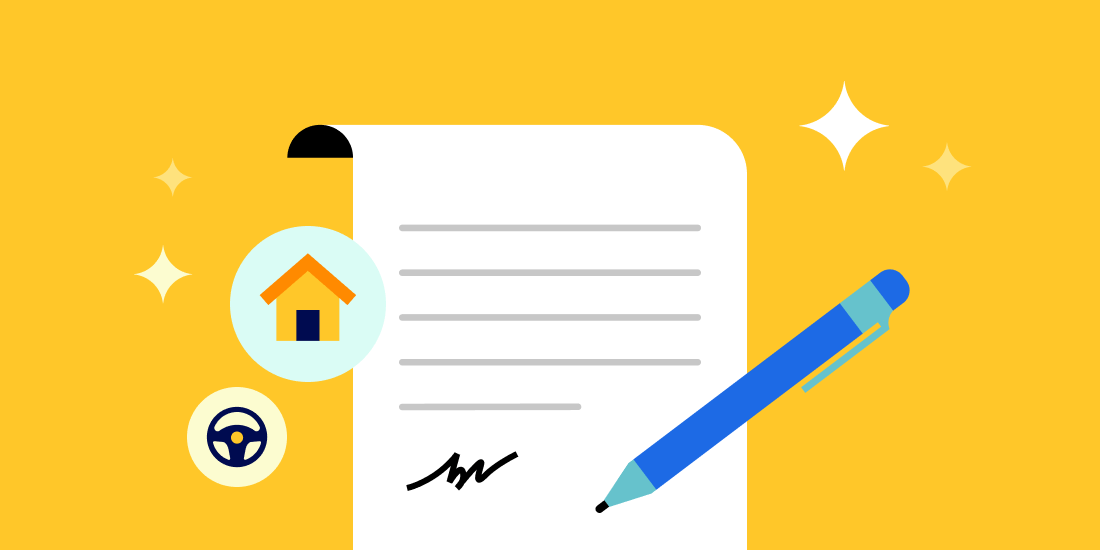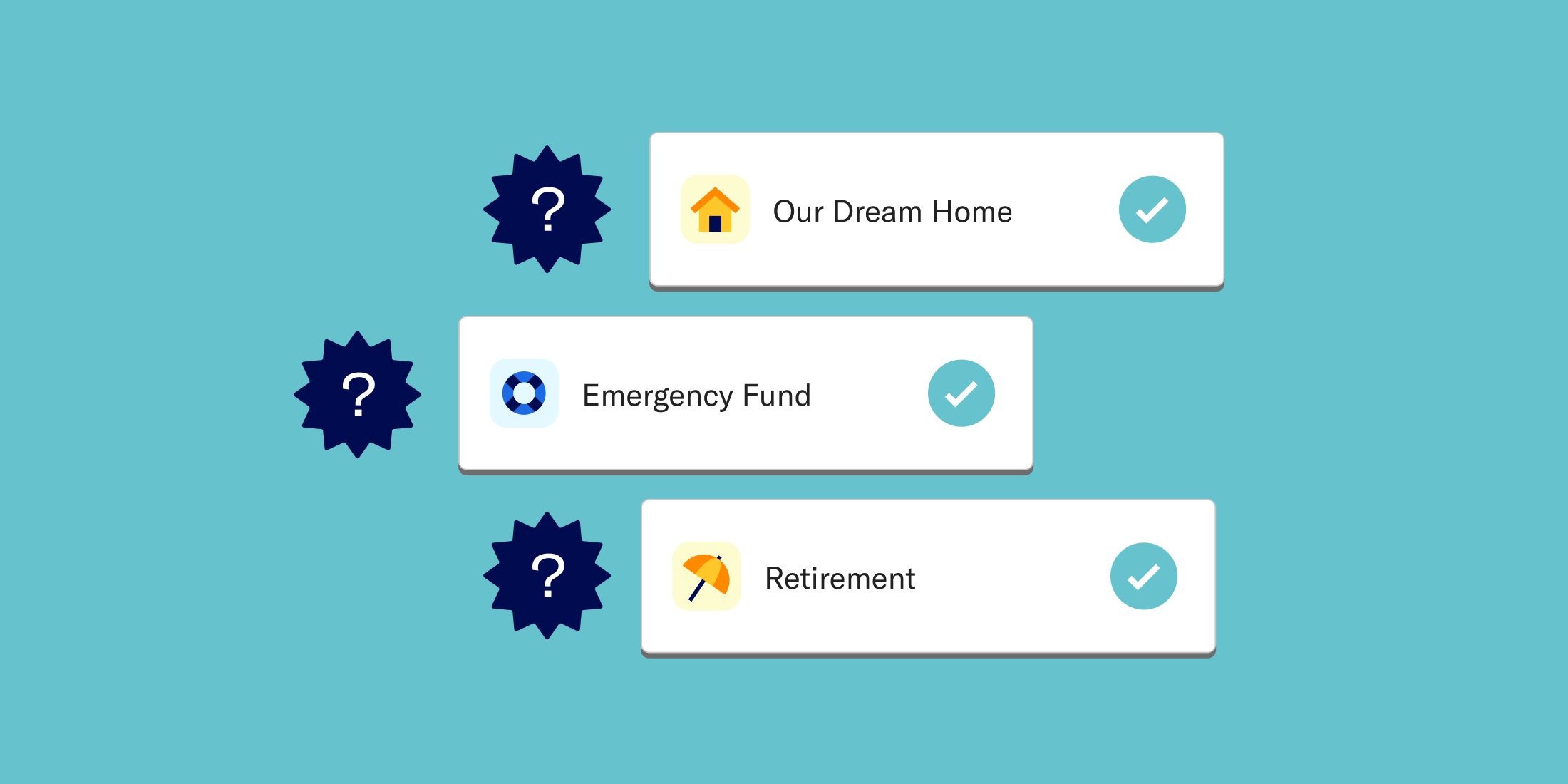Corbin Donahue, CFP®
Meet our writer
Corbin Donahue, CFP®
Senior Financial Planner, Betterment
Corbin Donahue is a CERTIFIED FINANCIAL PLANNER™ who works directly with Betterment customers to help them achieve their financial goals. Corbin has several years of experience in wealth management, and is passionate about helping customers in every phase of life succeed financially.
Articles by Corbin Donahue, CFP®
-
![]()
How to course correct when you simply can't stay the course
How to course correct when you simply can't stay the course May 12, 2025 3:20:36 PM De-risking during market volatility can be costly. Here’s how to do it without breaking the bank. The best course of action during market volatility is often inaction. That’s because selling riskier assets at a loss locks in those losses. It foregoes their potential for future growth, and it might also trigger capital gains taxes in the process. But if taking some sort of action feels necessary, then modestly reducing your overall risk exposure can be a reasonable alternative. Consider dialing down your existing stock allocation by a few percentage points, or lower the costs of recalibrating by using your future deposits instead. Either way, the solution may be the same: sprinkling in more bonds. Consider bonds to calm your investing nerves When people talk about diversification, equities like international stocks get most of the attention. But no less important in the role of managing risk are bonds. These are the loans given to governments and companies by investors, and while they're not completely risk-free (no asset is), the relatively-modest interest they tend to pay out can feel like a windfall when stock values are plunging. They won’t negate all of the volatility of stocks, but they can help smooth things out and preserve capital. This is why all of our recommended allocations include holding at least some bonds. One way to de-risk some of your future investing is with one of our portfolios made up of both stocks and bonds (Core, Value Tilt, etc.). We’ll recommend a risk level based on your goal, but we make it easy to dial up the bond allocation to your preference. Over time, you can slowly finetune things until your collective risk feels right. Or you can let us automatically adjust it based on your target date. We also offer two portfolios comprised entirely of bonds, each one designed for a different use: The BlackRock Target Income portfolio, designed to help you limit market volatility, preserve wealth, and generate income. The Goldman Sachs Tax-Smart Bonds portfolio, designed for high-income individuals seeking a higher after-tax yield compared to a cash account. Don’t forget about the role of cash One of the best ways to mitigate your overall financial risk is by shoring up your emergency fund, which may include a high-yield cash account like our Cash Reserve. Imagine losing your income stream, and how much time you'd want to get back on your feet. A good place to start is 3-6 months' worth of your essential expenses, but your right amount is whatever helps you sleep more soundly at night. Cash Reserve offered by Betterment LLC and requires a Betterment Securities brokerage account. Betterment is not a bank. FDIC insurance provided by Program Banks, subject to certain conditions. Learn more. Steadying the ship during unsteady times As we mentioned up front, right-sizing your risk during downturns isn’t always cheap. But there are ways to minimize the costs. Lowering your risk profile incrementally is one of them, and stretching out your safety net is another. Either way, it’s okay to recalibrate your risk tolerance from time-to-time, and you can do it wisely with Betterment. -
![]()
How to manage debt and invest at the same time
How to manage debt and invest at the same time Nov 1, 2024 10:00:00 AM With the right strategy, it's possible to make progress on both goals. Managing debt and investing is a tricky balancing act. You can’t do everything at once, but paying off debt and building wealth are both vital to your financial future. In this guide, we’ll explain how to manage debt and invest in six steps: Account for your spending Make minimum debt payments Contribute to an employer-matched retirement plan (if you can) Focus on high-interest debt Build an Emergency Fund Invest for the long-term First, let’s talk about your debt, your goals, and your repayment strategy. Planning around your debt Debt can completely derail your financial goals. It eats through your savings and can offset the gains you make through investing. Repaying major debt like student loans can feel like climbing a mountain. But not all debt is the same. High-interest credit card debt will quickly outpace your investment earnings. Ignore it, and it will consume your finances. Debt with lower interest rates, like some student loans or your mortgage, can be much less of a priority. If you put off investing in favor of attacking this debt, you may not have time to reach your goals. It is possible to pay debt and invest at the same time—the key is to create a strategy based on your debt and your financial goals. At Betterment, we recommend focusing on the debt with the highest interest first. The more time you give this debt to grow, the harder it becomes to pay off. Now let's walk through Betterment’s six steps to manage your debt and invest. Step 1: Account for your spending Your finances are finite. You have a limited amount of money to pay down debt, invest, and cover your expenses. The first step is to learn what comes in and goes out each month. How much do you have to work with after rent, food, utilities, and other fixed expenses? Are there expensive habits you can eliminate to free up more money? Don’t plan to make changes you can’t stick to. The goal here is to establish a monthly budget, so you have enough to cover your bills and know how much you can save or put towards debt. We also recommend keeping enough in your checking account to act as a small buffer—three to five weeks of living expenses is generally a good rule of thumb—as even the best laid plans (or budgets) are derailed at times. Step 2: Make minimum payments You really don’t want to miss your minimum payments. Fees and penalties make your debt hit harder, and they’re usually avoidable. Think of your minimum debt payments as fixed expenses. After your regular living expenses, minimum debt payments should be a top priority. Step 3: Contribute to an employer-matched retirement plan If your employer offers to match contributions to a 401(k), that’s free money! Don’t leave it on the table. A 401(k) also comes with valuable tax benefits. Even if it under performs, the match program allows your contributions to grow faster. It’s like your employer is giving your financial goals a boost. And that’s why this is almost always one of the smartest investment moves you can make. Step 4: Focus on high-interest debt When it comes down to it, high-interest debt is your biggest enemy. It’s a festering financial wound that grows faster than any interest you’re likely to earn. Left unchecked, credit card debt can easily cost you thousands of dollars in interest or more. And that’s money you could’ve invested, applied to other debt, or saved. Step 5: Build an Emergency Fund Without an emergency fund, you’re one unexpected medical bill, car accident, or surprise expense away from even more debt. Generally we encourage you to pay off your high interest debt before fully funding a three to six month emergency fund. However, some people, particularly those who are worried about income loss, prefer building a large cushion of cash for emergencies first over paying down extra debt. Step 6: Invest for the long-term Once you’ve paid down your high-interest debt, you can begin investing for the long-term. With a diversified portfolio, your investments can outpace your lower-interest debt. So you can work toward financial goals while making minimum payments. Using automatic deposits, you can create an investment plan and stick to it over time, treating your investments as part of your fixed budget. Your emergency fund will give you some financial breathing room, and before you know it, you’ll be making progress toward retirement, a downpayment on a house, college for your kids, or whatever your goal is. -
![]()
Putting together an estate plan for your investments
Putting together an estate plan for your investments Nov 1, 2024 9:00:00 AM Help make sure the right people make decisions on your behalf and receive the inheritance you want. If you suddenly found yourself on life support or developed a serious mental illness, what would happen to you? If you died tomorrow, what would happen to your children, and your things? State laws can answer these questions, or you can decide for yourself with an estate plan. By preparing in advance, you can help ensure that the right people make decisions on your behalf and that your loved ones receive the inheritance you want them to. (And if there’s anyone who shouldn’t receive an inheritance, your estate plan can keep them from cutting in.) In this guide, we’ll cover: What your estate plan needs to do Who should be part of your estate plan What documents to include in your estate plan An estate plan can define what will happen with the people and things you’re responsible for if you die or become incapacitated. Who will make medical or financial decisions on your behalf? Who will be your child’s new guardian? How will your finances be divided? Who gets the house? Those aren’t decisions you want a stranger to make for you. But without an estate plan, that could be what happens. Unless you say otherwise, state laws will govern your estate. And those generic laws may not align with your values and goals. That’s why whatever your age and whatever your financial situation, an estate plan is crucial. Before you start creating an estate plan, it helps to consider your unique situation. What does your estate plan need to do? Your estate plan can answer questions about what happens with your assets and how your loved ones will be taken care of when you’re gone. So you need to consider how you’d answer those questions now, anticipating choices that could come up in the future. For example, if you’re expecting to receive an inheritance, be sure to think through how your estate plan would distribute it or who would manage it. And if there’s anyone you need or want to financially support, that should guide your estate plan as well. Who should be part of your estate plan? An estate plan doesn’t just decide who gets what. It can also determine who’s in charge of what. There are several key roles to consider in your estate plan. You may want to divide these roles between multiple people, or let one call the shots. For example, if all of your children have the authority to make medical decisions on your behalf, that may lead to more thoughtful decisions. But it’s a trade off. Each of the people you give power to has to sign off on decisions, which can slow things down and make it much more difficult to coordinate. Financial Power Of Attorney (POA) Giving someone financial power of attorney can make it easier for them to pay bills, file taxes, or cash checks on your behalf. You can decide how broad or limited their control is. Even with broad authority, a financial power of attorney can’t change your will. The idea is that if you’re physically or mentally unable to take care of your day-to-day finances, you’ve designated someone to take care of that for you. Make sure the person you designate has a copy of this paperwork or knows where to find it. You can also give a copy to your financial institutions. Advanced Healthcare Directive An advanced healthcare directive helps decide how to handle medical decisions when you can’t make them yourself. It can lay out specific care instructions like, “Do not resuscitate,” but it can also give someone medical power of attorney to make decisions on your behalf. When you can’t think through important decisions anymore, who do you want to make the call? Your spouse? Your children? A parent? A sibling? As with financial power of attorney, you can define the scope of this power. Joint Owner If you name someone the joint owner of your accounts, then when you die, they become the sole owner. This is a common way for married couples to handle their estates, and it usually keeps the state from getting involved in distributing your assets when you die. Just keep in mind: anyone you name as a joint owner gains equal control of your assets while you’re alive, too. Also, retirement accounts such as 401(k)s and IRAs can’t be put into joint ownership. Beneficiaries You may also want individual assets to go to specific people. In that case, you may want to name beneficiaries for your bank accounts, investment accounts, life insurance policy, real estate, and other major assets. Name beneficiaries in your will, and these assets will have to go through probate first, where a court process proves that your will is authentic. This typically increases the time before your beneficiaries receive the inheritance and reduces the amount that ultimately makes it to them. For your accounts, adding beneficiaries can be as simple as filling out a form through your bank or investment firm. In some states, you may be able to use a Transfer on Death (TOD) Deed to ensure that your real estate goes directly to the beneficiary. What documents should your estate plan include? While there are many legal documents that make up an estate plan, two of the more important ones are a will and a trust. Here’s what those entail. Last will and testament A will serves several purposes. It can clearly lay out your final wishes, state who will take care of your non-adult children, and say who receives your belongings. If you do a good job naming beneficiaries for your assets, this mostly affects personal belongings. A will should usually start with a declaration. This identifies who you are and says that the document is your will. You’ll generally have to sign it in front of witnesses (and possibly a notary). You’ll need to choose an executor who will ensure your wishes are carried out, including any final arrangements for your death and funeral services. Your will can define the scope and limitations of their power as well as any compensation you want them to receive. If you have non-adult children, your will should name their new guardians. Wills also define bequests: individual gifts you give someone. Think family heirlooms. Clothing. Vehicles. Money. You can change your will at any time. And as your valuables and relationships change, you’ll want to keep it up to date. Trust A trust is a legal entity that gives someone (usually you) the right to hold your assets for the benefit of someone else. It provides several advantages that help your financial plan live on when you’re gone. Some types of trusts can shield your assets from estate taxes. They can also protect your assets from creditors, litigation, and even public records. As part of your trust, these assets also avoid probate. By using a trust, you keep greater control over your assets, too. You can define who gets your assets and when, as well as what they can do with them. With Betterment, you can open an account in the name of a trust–revocable or irrevocable–that you have already established. -
![]()
Three keys to managing joint finances with your partner
Three keys to managing joint finances with your partner Nov 1, 2024 8:00:00 AM Talking about money with your partner can be a difficult conversation. The key is to have open communication, sooner rather than later. Money has wrecked its fair share of relationships. Maybe you’ve even seen one of yours go up in flames because of it. But it doesn’t have to. And while every partnership is different, we’ve seen an emphasis on three areas help our clients avoid the worst of money fights: Communication Prioritization Logistics Whether you’re married or not, and whether you join your accounts or keep them separate, they can help soften one of love’s thorniest topics. Open (and keep open) those lines of communication When you choose to share your life with someone special, you bring all sorts of baggage with you. Among the bags you might want to start unpacking first is your relationship with money. It could be complicated, and there’s probably all sorts of emotions wrapped up in it—especially with debt—but transparency can help avoid unpleasant surprises down the road. So to start with, try sizing up the financial state of your union by crunching a few numbers for each of you: Net worth (assets − liabilities) This can be the most emotionally-charged of numbers, and it’s no surprise why. It’s right there in the name: net worth. We tend to bundle up our concept of our own self-worth with our finances, and when those finances don’t look pretty, feelings of shame or embarrassment may follow. So it’s important to support each other during this exercise. Help your partner feel safe enough to share these sensitive details in the first place. When you’re both ready, add up all your assets (cash, investments, home equity, etc.), then subtract your total liabilities—namely debt (credit cards, student loans, mortgage, etc.)—to get a good sense of your separate and combined balance sheets. If you’re a Betterment customer, connecting your external financial accounts to Betterment can be a handy shortcut for this number-crunching. Cash flow (income − expenses) Now comes the time to size up how much money is coming in and going out each month, with the difference being what you currently have available to save for all your goals (more on those later). For simplicity’s sake, it can be easier to start with your take-home pay, which may already factor in payroll taxes and expenses such as health care insurance. If you already contribute to a 401(k), which automatically comes out of your paycheck, be sure to count this toward your tallied savings when the time comes! Toss in a survey of your respective credit scores, which could affect future goals such as home ownership, and you’ve started to lay the foundation for a healthier money partnership. And by no means is this a one-time exercise. For some couples, it helps to schedule a monthly financial check-in. Why monthly? Some people don’t like talking about finances at all. A monthly check-in gives you a safe space to start the conversation. Others think and talk about money all the time, which can be draining on a partner. Unless it’s urgent, you can make a note and wait to bring it up until the next check-in. A recurring monthly check-in solves both these problems and provides a forum to talk about upcoming big expenses and important money tasks, among other things. To make things fun, you can build your check-ins around something you already enjoy, like a weekend morning coffee date. Prioritize as partners With key details like your net worth and cash flow in place, next comes the process of visualizing what you—as individuals and as a couple—want your money to do for you and your family. Couples don’t always see eye-to-eye on this, so now's the time to hash out any differences of opinion. If you have financial liabilities, know that it’s possible to manage debt and save at the same time; it all comes down to prioritizing. In general, we recommend putting your dollars to work in this order: Assuming your employer offers a 401(k) and matching contribution, contribute just enough to your 401(k) to get the full match so you’re not leaving any money on the table. Address short-term, high-priority goals such as: High-interest debt Emergency fund (3-6 months’ worth of living expenses) Save more for retirement in tax-advantaged investment accounts such as a 401(k) and IRA. How much more? Sign up for Betterment and we can help you figure that out. Save for other big money goals such as home ownership, education, vacations, etc. The devil is in the details with #4, of course. And you may not be able to save as much as you need to for every single goal at this time. Just know that if you start at the top and set specific goals—”I’ll contribute X amount of dollars each month to pay off my high-interest debt in X number of years,” for example—you’ll eventually free up cash flow to put toward priorities that fall further down on your list. Tend to the logistical paperwork With your planning well underway, next comes execution. How exactly will you set up your financial accounts? If you’re married, will you file taxes jointly or separately? And how will you update (or set up for the first time) your estate plan? These are three big questions best to start considering now. Set up your accounts for success There’s the process of jointly managing finances with your significant other, then there's the actual act of opening joint accounts. These are accounts you both share legal ownership of. Whether or not you decide to keep all or some of your accounts separate is a highly-personal decision. One way to address it is the “yours, mine, ours” approach, also known as the “three-pot” approach. To keep some financial autonomy, you and your partner might each maintain credit cards and checking accounts in your own names to cover personal expenses or debt repayments. The bulk of your monthly income, however, would go into a joint account to cover your monthly bills and shared expenses. Head on over to our Help Center for more information on how to manage money with a partner at Betterment. If you’re married, weigh the pros and cons of filing taxes jointly In most cases, the financial benefits of you and your spouse filing one joint tax return will outweigh each of you filing separately, but it‘s important to know and understand your options. When you choose to file separately, you limit or altogether forgo several tax breaks and deductions including but not limited to: Child and Dependent Care Tax Credit Earned Income Tax Credit The American Opportunity Credit and Lifetime Learning Credit for higher education expenses The student loan interest deduction Traditional IRA deductions Roth IRA contributions That being said, you might consider filing separately if you find yourself in one of these scenarios: You and your spouse both have taxable income and at least one of you (ideally the person with the lower income) has significant itemized deductions that are limited by adjusted gross income (AGI). You participate in income-driven repayment plans for student loans. Filing separately may mean lower monthly loan payments in this scenario. You want to separate your tax liability from your spouse’s. If you know or suspect that your spouse is omitting income or overstating deductions and/or credits, you may want to file separately. You and/or your spouse live in a community property state. Special rules apply in these states for allocating income and deductions between each spouse’s tax return. Update (or establish) your estate plan An estate plan can define what will happen with the people and things you’re responsible for if you die or become incapacitated. Who will make medical or financial decisions on your behalf? Who will be your child’s new guardian? How will your finances be divided? Who gets the house? If you haven’t yet created one, now may be the time. And if you have, it’s important to keep it up-to-date based on your latest life circumstance. Don’t forget to update your beneficiaries on any accounts that may pass outside the estate. That’s because beneficiary designation forms—not your will—determine who inherits your retirement savings and life insurance benefits. You can review, add, and update beneficiary listings on your Betterment accounts online. -
![]()
How To Plan Your Taxes When Investing
How To Plan Your Taxes When Investing Oct 31, 2024 7:00:00 AM Tax planning should happen year round. Here are some smart moves to consider that can help you save money now—and for years to come. Editor’s note: We’re about to dish on taxes and investing in length, but please keep in mind Betterment isn’t a tax advisor, nor should any information here be considered tax advice. Please consult a tax professional for advice on your specific situation. In 1 minute No one wants to pay more taxes than they have to. But as an investor, it’s not always clear how your choices change what you may ultimately owe to the IRS. Consider these strategies that can help reduce your taxes, giving you more to spend or invest as you see fit. Max out retirement accounts: The more you invest in your IRA and/or 401(k), the more tax benefits you receive. So contribute as much as you’re able to. Consider tax loss harvesting: When your investments lose value, you have the opportunity to reduce your tax bill. Selling depreciated assets lets you deduct the loss to offset other investment gains or decrease your taxable income. You can do this for up to $3,000 worth of losses every year, and additional losses can count toward future years. Rebalance your portfolio with cash flows: To avoid realizing gains before you may need to, try to rebalance your portfolio without selling any existing investments. Instead, use cash flows, including new deposits and dividends, to adjust your portfolio’s allocation. Consider a Roth conversion: You can convert all or some of traditional IRA into a Roth IRA at any income level and at any time. You’ll pay taxes upfront, but when you retire, your withdrawals are tax free. It’s worth noting that doing so is a permanent change, and it isn’t right for everyone. We recommend consulting a qualified tax advisor before making the decision. Invest your tax refund: Tax refunds can feel like pleasant surprises, but in reality they represent a missed opportunity. In practice, they mean you’ve been overpaying Uncle Sam throughout the year, and only now are you getting your money back. If you can, make up for this lost time by investing your refund right away. Donate to charity: Giving to causes you care about provides tax benefits. Donate in the form of appreciated investments instead of cash, and your tax-deductible donation can also help you avoid paying taxes on capital gains. In 5 minutes Taxes are complicated. It’s no wonder so many people dread tax season. But if you only think about them at the start of the year or when you look at your paycheck, you could be missing out. As an investor, you can save a lot more in taxes by being strategic with your investments throughout the year. In this guide, we’ll: Explain how you can save on taxes with strategic investing Examine specific tips for tax optimization Consider streamlining the process via automation Max out retirement accounts every year Retirement accounts such as IRAs and 401(k)s come with tax benefits. The more you contribute to them, the more of those benefits you enjoy. Depending on your financial situation, it may be worth maxing them out every year. The tax advantages of 401(k)s and IRAs come in two flavors: Roth and traditional. Contributions to Roth accounts are made with post-tax dollars, meaning Uncle Sam has already taken a cut. Contributions to traditional accounts, on the other hand, are usually made with pre-tax dollars. These two options effectively determine whether you pay taxes on this money now or later. So, which is better, Roth or Traditional? The answer depends on how much money you expect to live on during retirement. If you think you’ll be in a higher tax bracket when you retire (because you’ll be withdrawing more than you currently make each month), then paying taxes now with a Roth account can keep more in your pocket. But if you expect to be in the same or lower tax bracket when you retire, then pushing your tax bill down the road via a Traditional retirement account may be the better route. Use tax loss harvesting throughout the year Some of your assets will decrease in value. That’s part of investing. But tax loss harvesting is designed to allow you to use losses in your taxable (i.e. brokerage) investing accounts to your advantage. You gain a tax deduction by selling assets at a loss. That deduction can offset other investment gains or decrease your taxable income by up to $3,000 every year. And any losses you don’t use rollover to future years. Traditionally, you’d harvest these losses at the end of the year as you finalize your deductions. But then you could miss out on other losses throughout the year. Continuously monitoring your portfolio lets you harvest losses as they happen. This could be complicated to do on your own, but automated tools make it easy. At Betterment, we offer Tax Loss Harvesting at no extra cost. Once you determine if Tax Loss Harvesting is right for you (Betterment will ask you a few questions to help you determine this), all you have to do is enable it, and this feature looks for opportunities regularly, seeking to help increase your after-tax returns. Keep in mind, however, that everyone’s tax situation is different—and Tax Loss Harvesting may not be suitable for yours. In general, we don’t recommend it if: Your future tax bracket will be higher than your current tax bracket. You can currently realize capital gains at a 0% tax rate. You’re planning to withdraw a large portion of your taxable assets in the next 12 months. You risk causing wash sales due to having substantially identical investments elsewhere. Rebalance your portfolio with cash flows As the market ebbs and flows, your portfolio can drift from its target allocation. One way to rebalance your portfolio is by selling assets, but that can cost you in taxes. A more efficient method for rebalancing is to use cash flows like new deposits and dividends you’ve earned. This can help keep your allocation on target while keeping taxes to a minimum. Betterment can automate this process, automatically monitoring your portfolio for rebalancing opportunities, and efficiently rebalancing your portfolio throughout the year once your account has reached the balance threshold. Consider getting out of high-cost investments Sometimes switching to a lower-cost investment firm means having to sell investments, which can trigger taxes. But over time, high-fee investments could cost you more than you’d pay in taxes to move to a lower cost money manager. For example, if selling a fund will cost you $1,000 in taxes, but you will save $500 per year in fees, you can break even in just two years. If you plan to be invested for longer than that, switching can be a savvy investment move. Consider a Roth conversion The IRS limits who can contribute to a Roth IRA based on income. But there’s no income limit for converting your traditional IRA into a Roth IRA. It’s not for everyone, and it does come with some potential pitfalls, but you have good reasons to consider it. A Roth conversion could: Lower the taxable portion of the conversion due to after-tax contributions made previously Lower your tax rates Put you in a lower tax bracket than normal due to retirement or low-income year Provide tax-free income in retirement or for a beneficiary Provide an opportunity to use an AMT (alternative minimum tax) credit carryover Provide an opportunity to use an NOL (net operating loss) carryover If you decide to convert your IRA, don’t wait until December—you’d miss out on 11 months of potential tax-free growth. Generally, the earlier you do your conversion the better. That said, Roth conversions are permanent, so be certain about your decision before making the change. It’s worth speaking with a qualified tax advisor to determine whether a Roth conversion is right for you. Invest your tax refund It might feel nice to receive a tax refund, but it usually means you’ve been overpaying your taxes throughout the year. That’s money you could have been investing! If you get a refund, consider investing it to make up for lost time. Depending on the size of your refund, you may want to resubmit your Form W-4 to your employer to adjust the amount of taxes withheld from each future paycheck. The IRS offers a Tax Withholding Estimator to help you get your refund closer to $0. Then you could increase your 401(k) contribution by that same amount. You won’t notice a difference in your paycheck, but it can really add up in your retirement account. Donate to charity It’s often said that it’s better to give than to receive. This is doubly true when charitable giving provides tax benefits in addition to the feeling of doing good. You can optimize your taxes while supporting your community or giving to causes you care about. To donate efficiently, consider giving away appreciated investments instead of cash. Then you avoid paying taxes on capital gains, and the gift is still tax deductible. You’ll have to itemize your deductions above the standard deduction, so you may want to consider “bunching” two to five years’ worth of charitable contributions. Betterment’s Charitable Giving can help streamline the donation process by automatically identifying the most appreciated long-term investments and partnering directly with highly-rated charities across a range of causes. -
![]()
Why saving for your kid's college isn’t a pass-fail proposition
Why saving for your kid's college isn’t a pass-fail proposition Oct 31, 2024 7:00:00 AM Investing even a modest amount now can make a noticeable difference down the road. In the long list of priorities during the early years of parenting, saving for your kid’s college may fall somewhere between achieving rock-hard abs and learning a foreign language. It’s not usually high on the list, in other words. And while more than 16 million American families save for college using a 529, a special tax-advantaged investing account for education expenses, more than half of parents (54%) aren't even aware of the tool. The relative lack of saving in this space should come as no surprise when you factor in the financial commitments of early childhood—daycare alone can feel like a second mortgage—but the statistic also presents an opportunity. Start saving for college a few years earlier, or even at all, and that’s more time for compound interest to potentially work its magic. The stakes are high considering the skyrocketing costs of college. Before we dive into some practical budgeting tips to address this topic, let’s pour out some whole milk for the unique struggle that is saving while also supporting a family. Financial planning from the parenting front lines A big part of the problem is that kids create a financial double whammy. They appear suddenly and start demanding, among other things, a share of your limited money supply. At the same time, they introduce a series of potential new savings goals. Think not only a college education but more immediate big ticket items like braces. When you heap these goals on top of your pre-existing ones, it can quickly feel overwhelming. So how do you save for them all? We suggest you don’t. Pick and prioritize only a handful, then define those goals more clearly. While this is a personal decision, your order of importance may look something like this: Retirement (contribute just enough to get your employer’s full 401(k) match, assuming they offer one) Short-term, high-priority goals High-interest debt (any loans at 8% and above) Emergency fund (3-6 months’ worth of living expenses) Retirement (come back to your tax-advantaged 401(k) and/or IRA and work to max them out) Other (home, college, etc.) Your kid’s college fund, as you can see, shouldn’t come before your personal goals. That’s because you can usually finance an education, but few banks will finance your retirement. That doesn’t mean your hopes of helping your kid with college are doomed, however. The key is to first size up your priority goals. This involves crunching some numbers and answering “How much?” and “How soon?” for each goal. In the case of college, “How much?” will depend on a few factors, decisions like private vs public, in-state vs out, etc. A calculator tool can help you with a rough estimate. In terms of “How soon?”—or in finance-speak, your “time horizon”—we recommend using the year your kid turns 22. That’s because parents tend to continue saving for college while their kids are enrolled. Once you have a rough idea of these two numbers, Betterment’s tools can tell you how much you should contribute each month to help increase your likelihood of meeting your goal. Do this for each of your priorities, and you very well might find you don’t have enough cash flow to cover them all. This is normal! Short-term goals, by nature, won’t soak up your cash flow forever, especially if you doggedly pursue them. Once met, you can redirect that money to other pursuits like a down payment on a house – or your kid’s college. Above all, forgive yourself if you fall short When it comes to saving for your child’s education, two things are true: You have precious few years from an investing perspective for compound growth to potentially work its magic. You may not be able to save as much as you’d like—or at all in the beginning—due to higher priorities. Given these realities, it’s okay to lower the bar. If you’re still working on high-interest debt and/or an emergency fund, set a goal of achieving those in 2-5 years so you can focus elsewhere afterwards. Or set up a seemingly small recurring deposit toward an education goal now. It could be $10, $25, or $50 a month. It can still make a difference down the road. If you ease your child’s student loan burden by even a little, you’ll have done them a huge favor. It’s a favor they probably won’t fully appreciate for a while, but since when was parenting anything but a thankless job? -
![]()
How much cash is too much cash to be in savings?
How much cash is too much cash to be in savings? Jan 4, 2024 12:13:48 PM Cash is great. But can you have too much? And what should you do with it? Let’s find out. The main point: If you have too much cash in savings, you may be missing out on growth from stock or bond investments. Consider having cash in savings for short-term needs and putting the rest into investing accounts. Facts about cash in savings: Cash in savings is liquid, meaning it is easy to access when you need to withdraw it for spending. Cash in savings is also low risk, meaning your money should not decrease in value like stocks if you stay within FDIC insurance limits. But—cash in savings does not have the opportunity to grow compared to cash in stocks and bonds, especially when savings rates are not keeping up with inflation. Finding a balance: To strike the right balance between cash and investments, consider the following: Cash is a secure option for your emergency fund. Most experts recommend having three to six months of living expenses saved. Cash is the lowest-risk option but you can use a mix of bonds and stock too. Take a close look at your situation and save what feels right for you. After that, take a look at your extra cash. Cash and investments can also be right for your short-term goals. Having cash in savings can be wise for short-term goals (we consider anything under 12 months short-term). But depending on how you’re defining short-term and your risk tolerance, you may consider putting some cash for shorter-term goals in bonds and stocks. Investments can support your long-term goals. For most goals longer than 12 months, consider putting your cash into stock and bond investments. While investing involves more risk, stocks have had greater long-term gains historically than leaving your cash in savings. We have options for you: Open a Cash Reserve account if you’re looking for a secure way to save. It’s a high-yield cash account that helps grow your savings while offering FDIC insurance up to $2 million ($4 million for joint accounts) through our program banks (up to $250,000 of coverage for each insurable capacity—e.g., individual or joint—at up to eight Program Banks), subject to certain conditions. We, Betterment, are not a bank ourselves. Cash Reserve offered by Betterment LLC and requires a Betterment Securities brokerage account. Betterment is not a bank. FDIC insurance provided by Program Banks, subject to certain conditions. Learn more. Open an investing account for your long-term goals. We’ll help assess your risk tolerance, provide investment recommendations, and make it easy to access expert-built portfolios to get you closer to your goals.







